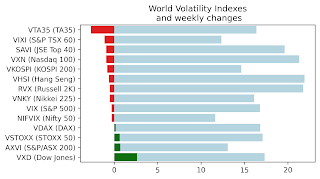Reader Eli asked in the comments "I used to program in Matlab a lot in the past. Now I feel that Python is a better way to go. Any thoughts?
Yes, quite a few - however I also hope to hear some ideas from other readers. Matlab is an excellent tool for analytics, and I have been using it for over a decade now. However if I were starting out in quantitative finance today I would probably go with Python. The main reason: Python is more popular - and bigger community means more ideas being exchanged, and potentially more job prospects. I get calls from recruiters telling me that quite a few banks have switched to Python as their main analytics tool.
However I am not ditching Matlab just yet. In my experience, Python is still much slower, more bloated, not as well documented as Matlab. Matlab is the Ferrari, where Python is basic Ford. The firm were I work pays for the license, for which I am immensely grateful!
The real question is, what's next? Matlab is not cheap, and it is important to stay on top of the latest tools. I suspect that Python will continue growing in popularity over Matlab.
But I think there are more interesting tools in development:
1 - Julia
2 - F# programming language. In particular I have been experimenting with FCore linear algebra library as stand-in for Matlab. Not all Matlab features are implemented, but basic support for logical indexing exists, and I was able to add simple custom functions to fill in whatever functionality I needed. Regression tools seem better that other .net linear algebra packages. I hope to write more about this in the future posts.
What tools are you using? Please share in the comments!
MATLAB Computational Finance Conference 2015
MATLAB Computational Finance Conference was a great event that I attended last year. There is a lot to learn for average Matlab user, and anyone working in finance. The agenda looks especially exciting this year. Ping me if you want to meet during the event.
Volatility Arbitrage Mutual Fund?
Indeed; just came across this article:
No other information about the fund available on American Beacon website.
More detailed information in the SEC filing. Ionic was managing the strategy since August 2013, and the performance has not been stellar: the fund returned only 3.2% since inception til end of 2014. Proposed managed fee is little over 1%. However this is not particularly surprising - afaik Ionic strategy is specifically long convexity, and would likely to underperform at times of stagnant volatility, like we had in the past few years.The American Beacon Ionic Strategic Arbitrage Fund ... [through it's] sub-advisor, Ionic Capital Management, will pursue ... a market-neutral ... strategy that consists of ...40-50% of the fund’s assets will be allocated to convertible arbitrage;20-30% will be allocated to credit/rates relative value arbitrage;30-40% will be allocated to equity arbitrage; and5-15% to volatility arbitrage.
No other information about the fund available on American Beacon website.
Subscribe to:
Comments (Atom)
Weekly market report
Wall st delivered a mixed bag of news with VIX, VNKY, and VSTOXX and their underlying markets almost unchanged. VXD - volatility index based...

-
John “Hojun” Hwang is the author of VIX, VIX Futures, and VIX ETNs, a conceptual guide to trading the VIX index. He graduated with degrees i...
-
This week 's market movements were largely driven by renewed recession fears in the wake of a sharp rise in office v...
-
Wall st delivered a mixed bag of news with VIX, VNKY, and VSTOXX and their underlying markets almost unchanged. VXD - volatility index based...


